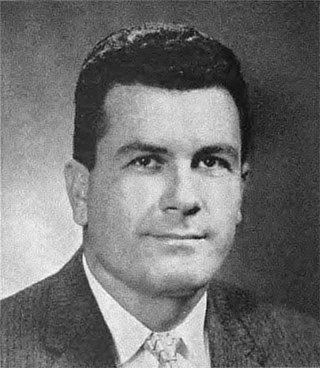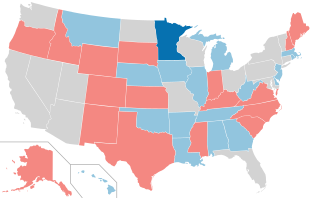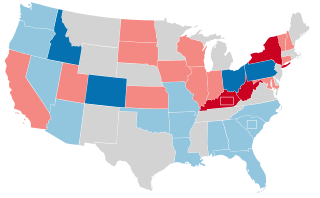
James Strom Thurmond Sr. was an American politician who represented South Carolina in the United States Senate from 1954 to 2003. Before his 48 years as a senator, he served as the 103rd governor of South Carolina from 1947 to 1951. Thurmond was a member of the Democratic Party until 1964 when he joined the Republican Party for the remainder of his legislative career. He also ran for president in 1948 as the Dixiecrat candidate, receiving over a million votes and winning four states.
A write-in candidate is a candidate whose name does not appear on the ballot but seeks election by asking voters to cast a vote for the candidate by physically writing in the person's name on the ballot. Depending on electoral law it may be possible to win an election by winning a sufficient number of such write-in votes, which count equally as if the person were formally listed on the ballot.

Albert William Watson was an American politician, a Democrat-turned-Republican state and U.S. representative from South Carolina. He is best known for his losing 1970 campaign for governor of South Carolina, which has been described as the last high-profile, openly segregationist campaign in American politics.

The 1996 United States Senate elections were held on November 5, with the 33 seats of Class 2 contested in regular elections. Special elections were also held to fill vacancies. They coincided with the presidential election of the same year, in which Democrat Bill Clinton was re-elected president.

The 1990 United States Senate elections were held on Tuesday, November 6, 1990, with the 33 seats of Class 2 contested in regular elections. Special elections were also held to fill vacancies. The Democratic Party increased its majority with a net gain of one seat from the Republican Party. The election cycle took place in the middle of President George H. W. Bush's term, and, as with most other midterm elections, the party not holding the presidency gained seats in Congress. Until 2022, this had been the only election cycle where only one U.S. Senate seat flipped parties.

The 1984 United States Senate elections were held on November 6, with the 33 seats of Class 2 contested in regular elections. They coincided with the landslide re-election of President Ronald Reagan in the presidential election. In spite of the lopsided presidential race, Reagan's Republican Party suffered a net loss of two Senate seats to the Democrats, although it retained control of the Senate with a reduced 53–47 majority. Democrats defeated incumbents in Illinois and Iowa, and won an open seat in Tennessee, while Republicans defeated an incumbent in Kentucky.

The 1978 United States Senate elections were held on November 7, in the middle of Democratic President Jimmy Carter's term. The 33 seats of Class 2 were contested in regular elections. Special elections were also held to fill vacancies.

The 1968 United States Senate elections were elections for the United States Senate. Held on November 5, the 34 seats of Class 3 were contested in regular elections. They coincided with the presidential election of the same year. The Republicans picked up five net seats in the Senate. This saw Republicans win a Senate seat in Florida for the first time since Reconstruction.

The 1966 United States Senate elections were elections on November 8, 1966, for the United States Senate which occurred midway through the second term of President Lyndon B. Johnson. The 33 seats of Class 2 were contested in regular elections. Special elections were also held to fill vacancies. With divisions in the Democratic base over the Vietnam War, and with the traditional mid-term advantage of the party not holding the presidency, the Republicans took three Democratic seats, thereby breaking Democrats' 2/3rds supermajority. Despite Republican gains, the balance remained overwhelmingly in favor of the Democrats, who retained a 64–36 majority. Democrats were further reduced to 63–37, following the death of Robert F. Kennedy in June 1968.

The 1956 United States Senate elections were elections for the United States Senate that coincided with the re-election of President Dwight D. Eisenhower. The 32 seats of Class 3 were contested in regular elections, and three special elections were held to fill vacancies. Although Democrats gained two seats in regular elections, the Republicans gained two seats in special elections, leaving the party balance of the chamber unchanged.

The 1954 United States Senate elections was a midterm election in the first term of Dwight D. Eisenhower's presidency. The 32 Senate seats of Class 2 were contested in regular elections, and six special elections were held to fill vacancies. Eisenhower's Republican party lost a net of two seats to the Democratic opposition. This small change was just enough to give Democrats control of the chamber with the support of an Independent who agreed to caucus with them, he later officially joined the party in April 1955.

Burnet Rhett Maybank was a three-term US senator, the 99th governor of South Carolina, and mayor of Charleston, South Carolina. He was the first governor from Charleston since the American Civil War (1861-1865) and one of twenty people in United States history to have been elected mayor, governor, and United States senator. During his tenure in the Senate, Maybank was a powerful ally of President Franklin D. Roosevelt. His unexpected death on September 1, 1954, from a heart attack, led to Strom Thurmond being elected senator.
The South Carolina Green Party is a ballot-qualified political party in the state of South Carolina. It is the state affiliate party of the Green Party of the United States.

Edgar Allan Brown was a long time Democratic legislator of South Carolina from Barnwell County who served South Carolina from 1922 to 1972. He was a principal member of the so-called "Barnwell Ring".

The 1978 South Carolina United States Senate election was held on November 7, 1978, to select the U.S. senator from the state of South Carolina. Popular incumbent Republican Senator Strom Thurmond defeated Democratic challenger Charles D. Ravenel.

The 1950 South Carolina United States Senate election was held on November 7, 1950, to select the U.S. Senator from the state of South Carolina. Incumbent Democratic Senator Olin D. Johnston defeated Strom Thurmond in a bitterly contested Democratic primary on July 11 and was unopposed in the general election.

The 1938 South Carolina United States Senate election was held on November 8, 1938, to select the U.S. Senator from the state of South Carolina. Incumbent Democratic Senator Ellison D. Smith defeated Governor Olin D. Johnston in the Democratic primary. The general election was contested, but a victory by Smith was never in doubt.

The 2010 United States Senate election in Alaska took place on November 2, 2010, to elect a member of the United States Senate to represent the State of Alaska, alongside 33 U.S. Senate elections in other states, elections in all states for the U.S. House of Representatives, as well as various state and local elections. The general election was preceded by primary elections which were held on August 24, 2010. Scott McAdams, the Mayor of Sitka, became the Democratic nominee; Joe Miller, an attorney and former federal magistrate, became the Republican nominee after defeating incumbent U.S. Senator Lisa Murkowski. Miller was endorsed by the Tea Party movement and former Governor Sarah Palin. Murkowski announced that despite her defeat in the primary, she would run in the general election as a write-in candidate.

The 2020 United States Senate election in South Carolina was held on November 3, 2020, to elect a member of the United States Senate to represent the State of South Carolina, concurrently with the 2020 U.S. presidential election, as well as other elections to the United States Senate, elections to the United States House of Representatives and various state and local elections.

The 1948 United States presidential election in Alabama was held on November 2, 1948. Alabama voters sent eleven electors to the Electoral College who voted for President and Vice-President. In Alabama, voters voted for electors individually instead of as a slate.





















